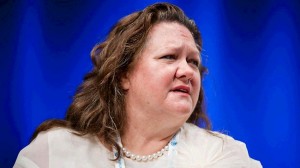 The Rinehart famly saga proves there’s no automatic bliss for billionaires
The Rinehart famly saga proves there’s no automatic bliss for billionaires
IN the wake of the Rinehart family brawl, it’s obvious to onlookers that there’s no correlation between money and happiness. While most of us ponder the thrill that can come from having trough- loads of moolah, and indeed of power, the cost can often be huge.
Australia’s wealthiest person Gina Rinehart’s three eldest children have launched very public, very bitter action against her in court. The family feud is over ownership of the trust set up by their grandfather, Lang Hancock, for his grandchildren.
In the 1980s I wrote a bestseller, The New Boy Network, about the rich and powerful who dominated our business scene. The premise of the book was that the subjects all came from immigrant backgrounds and were self-made millionaires and billionaires.
I interviewed the likes of Alan Bond, Hooker Corporation’s George Herscu, FAI Insurance’s Larry Adler (father of Rodney), Westfield’s Frank Lowy, developer Bruno Grollo, AdSteam’s John Spalvins and a host of Greek, Lebanese, Italian and other businessmen who arrived just before or after World War II and built this country.
Two decades later, many were in some sort of trouble, had died prematurely, or had gone broke. The list of those who didn’t thrive or who hit a serious bump is long. I had sailed in their yachts, flown in their private planes and sat in their harbourside Jacuzzis, marvelling at a world I could watch only from afar as a working journalist.
But even then there were family feuds brewing, business deals that looked far too risky, and a desperate need to prove themselves that made many doyens push far beyond the pleasure of any current achievements. The result of severe burnout was often miscalculation, illness and damage to primary relationships.
I have pondered much over the years about greed, egoism and workaholism. About raw ambition and the maelstrom of woes that plays out behind golden doors. The settings of these dramas are magnificent and to be envied. But the human and family dramas themselves are the same as those that can occur behind the picket fences of suburbia: jealousy, bullying, jostling for power, hurt, mental unrest, neglect and favouritism.
It’s not that Rinehart or the people in my book have more issues than the rest of us; it’s just that power, money and fame has never made anyone immune from suffering.
Driving through the poorest parts of Africa recently, I was heartened by the joyful singing, laughter and communal spirit. There may be 10 people crammed into a room, but they all love each other and are raised to kindness. I know it’s all been said before, but as the Rinehart story attests, there is no link between material success and happiness.

Ruth,
This is a good story and only too true, but it doesn’t stop people from wanting to be rich. Greed is deeply embedded in homo sapiens.
Guess we still live in the stone age.
You can have too much money, or not enough money or just enough money but you can never have too much happiness. I’ve never had too much money, maybe at one stage I had just enough money and these days shortage of money is a constant struggle. The experiences that make me happy such as love, achievement, success can be facilitated or thwarted by not enough money. It’s difficult to be happy if you don’t have enough money to buy food and a loving relationship can be strained and torn apart by the constant struggle to survive when money is scarce. Money is a tool to help us achieve happiness but happiness isn’t the love of money. Gina has too much money and puts too much emphasis on making more money, so I doubt that she is happy.